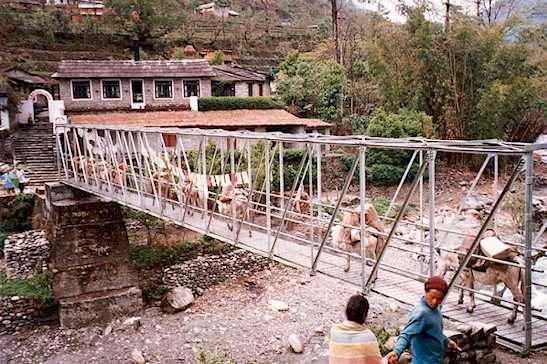
Nepal RPCV Tom Hammett helps capitalism take root amid the Himalayas
Reaching out to the roof of the world
The U.S. State Department turns to Virginia Tech to help capitalism take root amid the Himalayas.
By Kevin Miller
kevin.miller@roanoke.com
BLACKSBURG - Virginia Tech is reaching out to small business owners on the other side of the globe as part of the U.S. government's ongoing diplomatic war against communism.
The Himalayan nation of Nepal and Appalachia share little in terms of culture and politics. But the two mountainous regions have at least one commonality when it comes to business: Both are filled with small companies in poorer communities with niche market potential.
For the past 12 years, the Virginia Tech Business Technology Center has sent students and faculty to work with small businesses throughout Southwest Virginia on everything from marketing to strategic planning. Tech recently received a $180,000 grant from the U.S. Department of State to launch a similar program at Nepal's Kathmandu University.
The U.S. government hopes the Tech program will encourage capitalism in a country torn by a communist insurgency that has claimed thousands of lives during the past eight years. University officials, meanwhile, view the project in
humanitarian and economic terms, not political ones.
"Our role is not to come in and change the politics of a local community. It is to help the social and economic well-being of the people in these communities," said John Dooley, Tech's vice provost for outreach and international affairs.
Wedged between China and India, the world's two most populous nations, Nepal is a mostly agrarian society of roughly 22 million people best known today as the home of Mount Everest. The population is largely poor and uneducated, with a literacy rate of 40 percent and a per capita income of just $226.
For hundreds of years, the Nepali people have sold rare herbs and fine handcrafts to traders following ancient routes between China and India. Tom Hammett and his Virginia Tech colleagues hope to help them sell their goods on the world market and attract high-tech companies.
Hammett, an associate professor of forest products marketing, has worked in Nepal off and on for 30 years, beginning with his service in the Peace Corps. He returned to Nepal recently with the business technology center's director, John Politis, to meet with officials from the private, nonprofit Kathmandu University as well as visit several herbal nurseries and factories.
Worldwide demand for such herbal products as specialty teas and dietary supplements has exploded in recent years, especially in the United States and other Western countries. Hammett believes Tech's program can help Nepali companies sell their herbal products on an international market.
In turn, the partnership could bolster Tech's international reputation as well as open up trade between the commonwealth and Nepal.
"If we want to be good stewards of global resources, then we should be concerned beyond Virginia," Hammett said. "And Nepal may be small, but it may be a market for Virginia companies."
In their grant application, project leaders said they hope to "enhance the global opportunities" of 30 Nepali businesses, teach dozens of Nepali students international business skills and hold workshops. The end goal is for the business assistance program to largely function on its own once Tech's two-year project expires.
Hammett said he plans to eventually involve Tech undergraduate and graduate students in the project. Students play a central role in the business technology center's programs in Virginia.
During their tour, Hammett and Politis visited a paper production plant that, to many American observers, bears closer resemblance to a roadside dump than a productive factory. Despite the primitive appearance, the factory is the type of stable, locally successful company that Politis believes could easily tap into international markets with some guidance from Tech faculty and students.
"Surprisingly, a lot of the same fundamentals still exist," Politis said. "Whether you are a high-tech manufacturing environment or whether you are in a more manually [oriented] manufacturing environment ... you still need to understand your market, who your customer is, who your competition is. And you still need to develop a strategy for bringing products to market."
Virginia Tech has programs in more than 40 countries worldwide and on every continent except Antarctica. Projects range from helping African farmers grow sustainable crops to surveying wildlife in the rain forests of Central America.
Dooley, the Virginia Tech vice provost, sees the Nepal project as the "fulfillment of our outreach mission on an international basis." Dooley also hopes the project will lead to additional academic collaborations between the two universities, such as student and faculty exchanges.
"At this point in time, to be a great university, you need to have those types of programs and strategies," Dooley said. The federal grant also counts toward Tech's goal of becoming a Top 30 research institution by decade's end.
But the Nepal project is unusual given the country's turbulent political situation.
Since 1996, Nepali government troops have been fighting Maoist rebels determined to turn Nepal into a communist state. The conflict has claimed the lives of an estimated 9,000 soldiers and civilians, including more than 130 people during a clash last week.
Heavily armed soldiers patrol the streets of Kathmandu, and worker strikes brutally enforced by the Maoists frequently bring to a halt most business in the capital, Politis said.
Chad Miller, an economic development specialist with Tech who focuses on international initiatives, describes the State Department program as "public diplomacy" intended to encourage free-market economic development as well as develop business and personal connections between the two cultures.
Tech plans to take a delegation of Kathmandu University faculty on a tour of Southwest Virginia, he said.
"Instead of Coca-Colas and Marlboros, they will see a lot of small companies in Virginia that have similarities," Miller said. "So I think it gives America a more personal touch."
